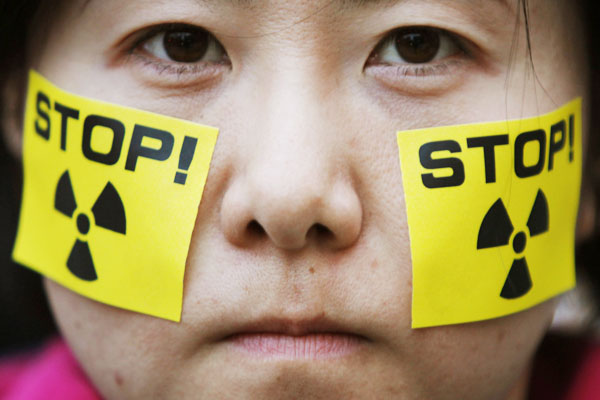Asia
Japan orders compensation for nuclear plant evacuees
Updated: 2011-04-16 08:18
(China Daily)
|
 A protester rallies in front of Tokyo Electric Power Co (TEPCO) headquarters on Friday. Roughly 48,000 households living within about 30 km of the crippled Fukushima Daiichi nuclear plant would be eligible for compensation. [Photo/Agencies] |
TOKYO - The government ordered the operator of Japan's tsunami-damaged nuclear plant on Friday to pay an initial $12,000 for each household forced to evacuate because of leaking radiation - a handout some of the displaced slammed as too little.
| ||||
Some have traveled hundreds of kilometers to Tokyo Electric Power Co's (TEPCO) headquarters in Tokyo to press their demands for compensation.
"We have decided to pay provisional compensation to provide help for the people (who were affected)," TEPCO President Masataka Shimizu said at a news conference.
The utility company will start paying out the roughly 50 billion yen ($600 million) in compensation on April 28 to those forced to evacuate, with families getting 1 million yen (about $12,000) and single adults getting 750,000 yen (about $9,000), the government said.
Roughly 48,000 households living within about 30 km of the crippled Fukushima Daiichi nuclear plant would be eligible for the payments, said Trade Ministry spokesman Hiroaki Wada. More compensation will be expected later, he said.
"I'm not satisfied," said Kazuko Suzuki, a 49-year-old single mother of two teenagers from the town of Futuba, adjacent to the plant.
Shimizu said that 2 trillion yen ($24 billion) will be needed to resolve the continuing problems with the plant and to restart conventional power stations to make up for power shortages.
Shimizu said that the utility will consider cutting the salaries for executives as well as a number of its employees.
The company is still struggling to stabilize the nuclear plant after its cooling systems failed after a magnitude-9.0 earthquake on March 11 triggered a massive tsunami, which wrecked emergency backup systems as well as much of the plant's regular equipment.
Radiation leaks from the crisis have contaminated crops, and power operators are required to shoulder costs for compensation for failures of reactor operations and other accidents, except in cases "caused by a grave natural disaster of an exceptional character, or by an insurrection", the country's Act on Compensation for Nuclear Damage stipulates.
Politically, however, it would be difficult for TEPCO to evade paying damages given the complex nature of the problems that have unfolded at the plant and questions that have risen over its disaster preparedness, among other issues.
It is unclear, however, whether TEPCO is likely to face lawsuits going forward. Most Japanese prefer to avoid the cost and publicity of going to the courts for redress, and the country relies heavily on non-judicial resolution of disputes.
With the northeastern coast still a wreck, at least one poll shows public support for increasing taxes to pay for disaster recovery. Japan's national debt is already twice as big as its GDP.
According to a random telephone poll of 1,036 people by the Yomiuri Shimbun over April 1 to 3, some 60 percent of respondents said that they would support higher taxes for recovery efforts.
When asked about the possibility of such a tax, Chief Cabinet Secretary Yukio Edano was noncommittal, but did not rule it out.
Associated Press
E-paper

Han me downs
Traditional 3,000-year-old clothes are making a comeback.
Reaching out
Fast growth fuels rise in super rich
Chinese tourists spend more
Specials

Big spenders
More mainland tourists are expected to spend money on overseas travel this year.

Rise in super rich
Report cites rising property prices, gdp as key drivers of increasing number of chinese millionaires.

Reaching out
Condom makers are stepping up their presence in smaller cities to boost sales




